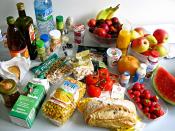Can Science feed the world?
Over 8 x 108 (18% of the population in the developing world) are living in uncertainty of their next full meal. And 1.85 x 108 million preschool children suffer compromised mental and physical development because of malnutrition. About 8 x 107 people are expected to be added to the global population every year for the next 25 years. Global demand for grain is projected to increase by 55% between 1990 and 2020; for livestock products, 75%; for roots and tubers, 50%.
Existing technology and knowledge will not permit production of the food needed to assure a food-secure world in the years to come. There are no grounds to assume that yield increases can and will continue to grow at the same rates as in the past, so here is the main question: can science feed the world?
What has caused all these problems?
The answer to that is; insect-borne diseases, the pests, and the misuse and overuse of fertilizers, herbicides and pesticides and water.
The input of these into the environment has led to environmental degradation and the depletion of water supplies.
Ways science can help
There are ways through which these goals can achieved. The reduction of soil erosion, more effective capture and use of moisture in soil, recycling of organic plant nutrients, and the integration of livestock and trees into cropping systems: are some of the many ways through which the people of the third world may be helped.
Another idea is planting transgenic crops (crops which have had their genome altered by the transfer of a gene or genes from another species or breed) in the center of diversity of that crop. An example would be planting transgenic potatoes in Peru or transgenic corn in Mexico. Scientists hope though that these transgenic...



Can Science Feed The World?
The layout of this essay was very interesting.
They asked a question to start the next peragraph, which made you think about what you were reading.
3 out of 3 people found this comment useful.